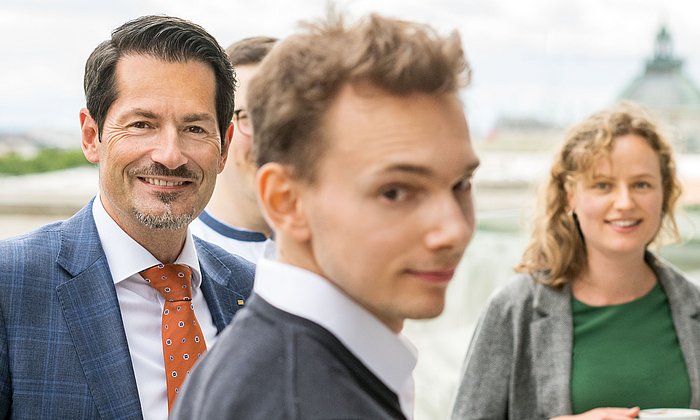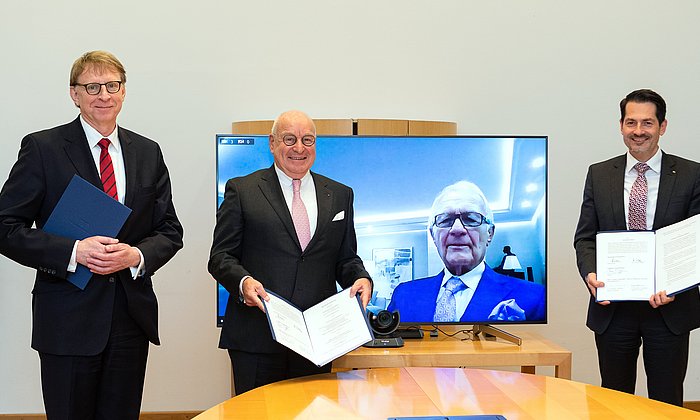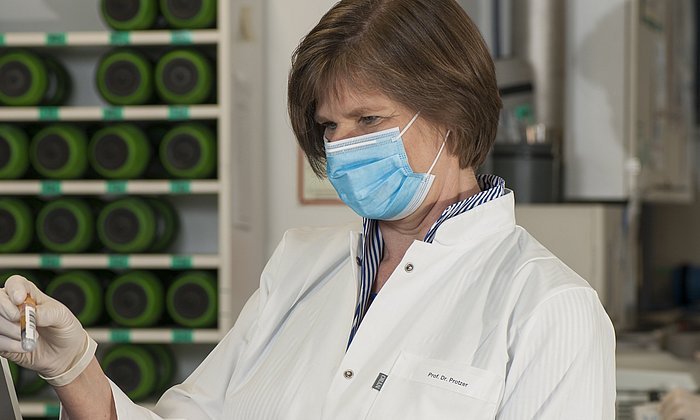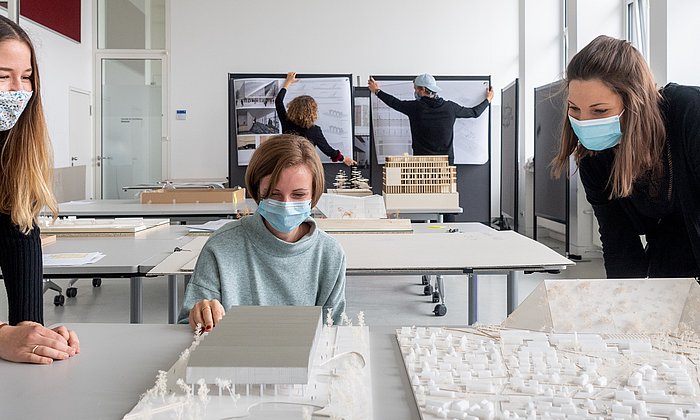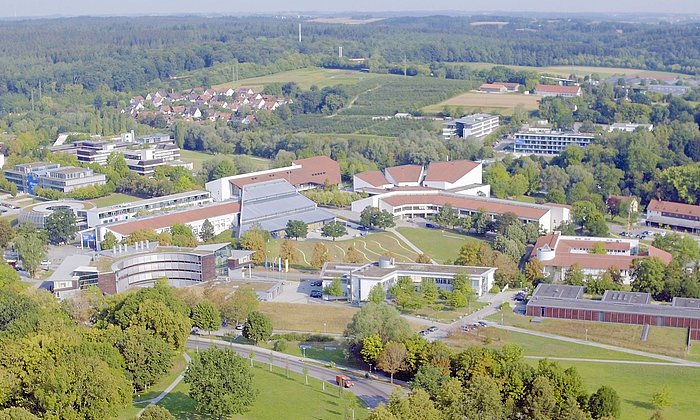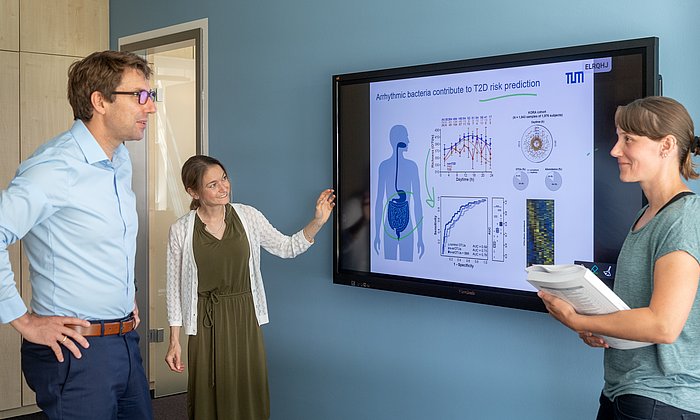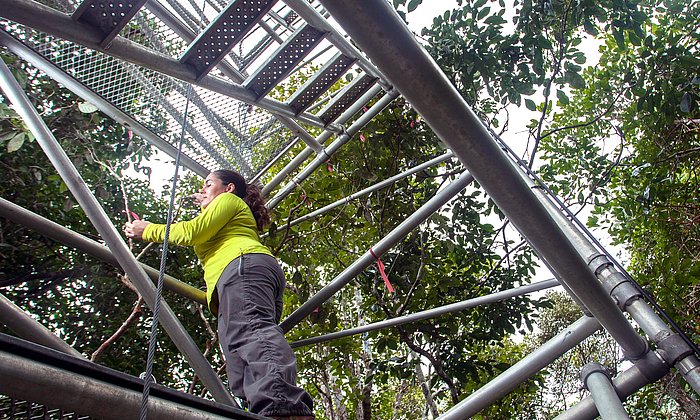First digital annual celebration
“We’re working hard on the future”
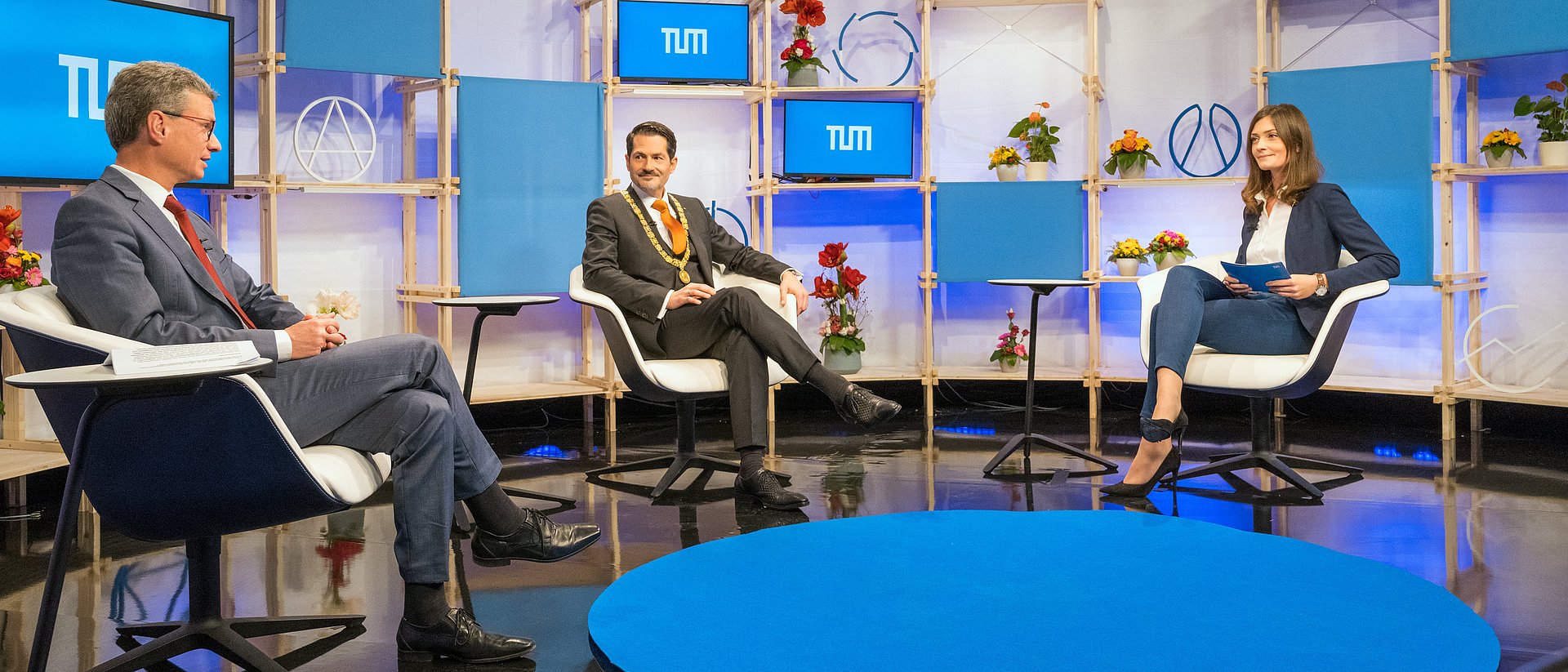
More than 30,000 teaching videos produced within tight deadlines, 500 students supporting the digitalization of teaching, around 300 research projects studying the new coronavirus as well as drugs, technologies and socio-economic concepts to fight the spread of the pandemic: The staff and students at TUM have shown extraordinary commitment this year in conducting research for the public good and ensuring that the talented people at the university continued receiving the teaching they need.
Addressing the annual Dies Academicus, President Thomas F. Hofmann thanked them for their hard work: “The year 2020 has made heavy demands on all of us – day in and day out – and has pushed many of us to the limits of our endurance. This makes it more important than ever for the university community to reach out to one another, at least in our thoughts, and to share a sense of team spirit.” He addressed special thanks to the staff of the Klinikum rechts der Isar and the German Heart Center: “Those who have continued to provide health care during these critical times deserve our utmost respect.” Read complete speech (PDF download from mediaTUM)
“There is a future after the pandemic”
In another first, following the successful online welcoming address to first-year students, this year’s Dies Academicus celebration was also staged digitally. With TUM student Silja Wöhrle acting as moderator, President Hofmann took part in a discussion with the Bavarian Minister of Science Bernd Sibler, who said: “International excellence, the spirit of innovation, a belief in progress and the pursuit of the highest standards of research and teaching designed for the challenges of the future – these are key trademarks of the Technical University of Munich. This has also been impressively demonstrated during the COVID-19 pandemic. I would like to express my sincere thanks to the entire university community!” In particular he mentioned the regulations for students in the pandemic summer semester, which will now be extended to the winter semester.
During the discussion he also commented on the planned university reform: “With our new university innovation law, we are creating an excellent framework for TUM and all of the other state universities to make optimal use of their strengths and potential and establish structures precisely aligned with their individual profiles. The benchmark, as always, is the high quality of our Bavarian university landscape. In this way we are developing our universities in line with future needs in order to push them higher in the international competition and enhance our appeal to the world’s best minds.”
The student representative Henry Winner described the challenges of studying in cramped or noisy living conditions with no face-to-face contact with other students and noted the benefits of the many rule changes initiated by the Ministry of Science and TUM. The lessons learned should also be applied after the pandemic is over, for example by developing additional learning shared spaces modeled on the StudiTUM buildings: “There is a future after the pandemic. A future where we students will want to join study groups again or just study away from where we live.”
“Despite all of the restrictions, we have worked hard on the future – in our attitudes, on course contents and in structural terms,” said President Hofmann. Key developments over the coming year will include the restructuring of TUM into an efficient school system that will energize teaching, new research programs such as a center for solid electrolytes and an AI-based future factory (TUM Nemetschek Institute – Artificial Intelligence in the Built World), and unique cooperative undertakings such as a new building jointly developed by TUM and SAP on Campus Garching.
Individual awards presented for outstanding achievements
During and prior to the annual celebration, TUM and its partners presented honors to highly deserving employees and guests:
TUM awards the Heinz Maier-Leibnitz Medal for outstanding scientific achievements.
Prof. Dirk Haller: The head of the Chair of Nutrition and Immunology was honored for his internationally respected research on the role of nutrition and the microbiome in the pathogenesis of chronic diseases. The understanding of the gut microbiome can make an important contribution to disease prevention in the future.
Prof. Ulrike Protzer: The director of the Institute for Virology has made outstanding efforts in helping to control the spread of the coronavirus pandemic. The award also recognizes her scientifically well-founded and thoughtful communications to the public. She has also contributed as an advisor to policy makers, particularly as a member of Bavarian state government’s expert advisory council. In addition, the award citation praises her excellent research on virus-host interactions.
The award recognizes promising new research that holds the potential to make a decisive contribution to the ecological transformation of economy and society.
Prof. Anja Rammig: The holder of the Professorship for Land Surface-Atmosphere Interactions studies the effects of climate change on the biosphere and the feedback of these effects on the atmosphere. The focal point of her work is the investigation of the rain forest in the Amazon basin.
The Friedrich Schiedel Foundation and TUM present this prize to personalities who contribute to a deeper understanding of interactions between politics, society and technology.
Prof. Kathleen Thelen: The political scientist at the Massachusetts Institute of Technology (MIT) has done important work on the origins and evolution of political-economic institutions in the rich democracies. The award recognizes in particular her research on the regulation of new technologies and large technology companies.
This award is presented by TUM and the chemicals company Clariant for excellent work in the field of catalysis.
Prof. Yang Shao-Horn: The professor of Energy and of Mechanical Engineering and Materials Science at the Massachusetts Institute of Technology (MIT) has conducted trailblazing fundamental research and application development in the areas of lithium ion batteries, metal-air batteries, high and low temperature fuel cells and electrolysis.
The Johannes B. Ortner Foundation presents the awards for outstanding work by young researchers and academics at TUM.
Dr. Friederike Adams, Department of Chemistry, for her doctoral thesis “From Michael-type Systems to biobased lactones: Designing novel polymer microstructures with modified bis(phenolate)lanthanides”
Bettina Chocholaty, Department of Civil, Geo and Environmental Engineering, for her master’s thesis “BEM-FEM coupling for the analysis of soil-building interactions over time”
Dr. Veronika Dill, Department of Medicine, for her doctoral thesis “Overcoming acquired aptoptosis resistance as a therapeutic approach for patients with myelodysplastic syndromes (MDS) and patients with secondary acute myeloid leukemia (sAML)”
Laura Eberhardt, Department of Architecture, for her master’s thesis “Hospice – accommodation for the dying. Scientific paper and architectural design project”
Dr. Rebecca Preller, TUM School of Management, for her doctoral thesis “The Entrepreneurial Team Journey: Collectively Exploring the Venture’s Future”
Kristina Witzgall, TUM School of Life Sciences, for her master’s thesis “Feedback loops between plant residues, microorganisms and soil in the formation of organic soil material”
This award recognizes exemplary support for Ph.D. students. The winners are selected by the TUM Graduate Council, the body representing the university’s doctoral candidates. The prize money of 5,000 euros, which must be used for purposes benefiting the doctoral candidates, is funded by the TUM Graduate School.
Prof. Dimitrios Karampinos: The professor for Experimental Magnetic Resonance Imaging was selected for his excellent work with doctoral candidates, in which he supports them with his expert knowledge while giving them the freedom they need to pursue their research. The award also recognizes his impressive personal commitment and outstanding working atmosphere he provides. The candidates also appreciated the contacts made available to research groups and industrial partners around the world.
TUM grants this award to entrepreneurs who serve as role models.
Catharina van Delden: The TUM alumna and successful start-up founder has earned a reputation as a committed decision maker and supporter of subsequent generations in the Munich start-up community. With three other TUM alumni, Catharina van Delden established innosabi GmbH, a tech company providing a software for innovation management to corporations. She still maintains close contact with TUM and supports current and future entrepreneurs.
The Karl Max von Bauernfeind Medal is awarded to TUM members who have demonstrated an outstanding commitment to the university.
Dr. Andreas Fleischmann: The director of ProLehre was honored for his remarkable achievements in guiding, supporting and facilitating digital teaching in the 2020 summer semester.
Markus Haggenmiller: The director of Central IT in the IT Service Center was instrumental in enabling more than 1200 TUM employees to work from home, while keeping numerous technical systems running smoothly.
Zhenshan Jin: The director of the TUM office in Beijing made an important contribution in the early stages of the coronavirus outbreak by supplying the Klinikum rechts der Isar with urgently needed medical masks and protective clothing.
Gabriele Kunnes: The director of the Studies and Teaching – Legal Affairs unit in the TUM Center for Study and Teaching provided excellent legal advice and support during the process of discussing and drafting the Bavarian legal framework for electronic examinations. This enabled TUM to play a pioneering role in future-ready exam formats.
Technical University of Munich
Corporate Communications Center
- Klaus Becker
- klaus.becker@tum.de
- presse@tum.de
- Teamwebsite
